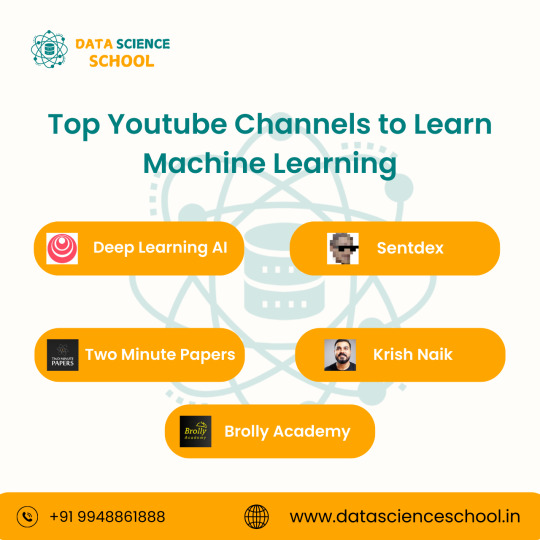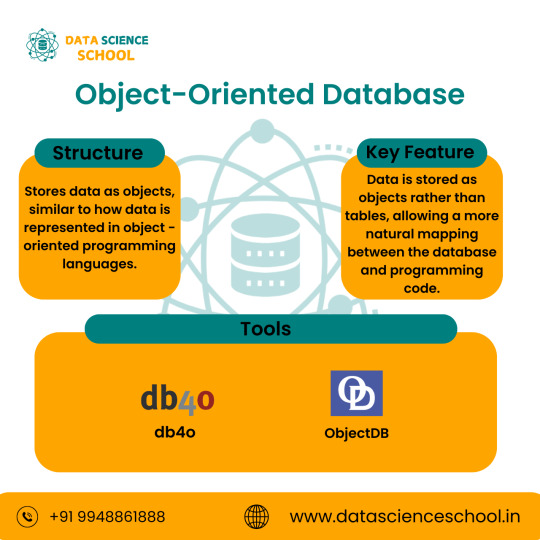#datascienceschool
Explore tagged Tumblr posts
Text

Want to master Machine Learning? Here are the Top YouTube Channels to help you get started! 📊💡
🎯 Deep Learning AI 🎯 Sentdex 🎯 Two Minute Papers 🎯 Krish Naik 🎯 Brolly Academy
Follow these amazing channels to level up your ML skills! 🔥
📌 Save this post & start learning today! 📞 +91 9948861888 🌐 www.datascienceschool.in
#MachineLearning #DataScience #DeepLearning #AI #YouTubeLearning #TechEducation
#datascience#machinelearning#datascienceschool#ai#python#data scientist#learndatascience#bigdata#data#database
0 notes
Text

🚀 Quiz Time! 🚀 What is the primary goal of Principal Component Analysis (PCA)? 🤔💡 Drop your answers in the comments! ⬇️
Stay tuned for more exciting data science quizzes! 📊✨
📞 Contact us: +91 9948861888 🌐 Visit: www.datascienceschool.in
#DataScience #MachineLearning #PCA #QuizTime #DataAnalytics #AI
#datascience#machinelearning#datascienceschool#ai#python#data scientist#learndatascience#bigdata#data#database
0 notes
Text

🚀 Why choose Data Science School? 🚀
✅ Experienced Trainers ✅ Industry-Ready Curriculum ✅ Soft Skills Training ✅ 100% Placement Assistance
Transform your career with the right guidance! 🔥
📞 +91 9948861888 🌍 www.datascienceschool.in
#DataScience #CareerBoost #TechLearning #JobReady #LearnWithExperts
#datascience#machinelearning#datascienceschool#ai#python#data scientist#learndatascience#data#bigdata#database
0 notes
Text

🔍 Master Data Pre-processing! 🚀
Key steps: ✅ Exploratory Data Analysis ✅ Train-Test Split ✅ Data Cleaning & Normalization ✅ Feature Engineering
Learn more 👉 www.datascienceschool.in
📞 +91 9948861888
#DataScience #AI #MachineLearning
#datascience#machinelearning#datascienceschool#ai#python#data scientist#learndatascience#bigdata#data#database
0 notes
Text

The Dark Side of Data Science: Bias in AI 🤖⚖️"
AI can learn biased patterns, leading to unfair decisions in jobs, policing & loans. How can we make AI more ethical? 🧠💡
📞 +91 9948861888 | 🌐 datascienceschool.in
#AI #BiasInAI #EthicalAI #DataScience
#datascience#machinelearning#ai#datascienceschool#python#learndatascience#data scientist#bigdata#data#database
0 notes
Text

🚀 Boost Performance with Columnar Databases! 🚀
⚡ Faster reads & writes 📊 Optimized for big data analytics 🔹 Tools: Cassandra | HBase | BigTable
Learn more 👉 www.datascienceschool.in
#DataScience #BigData #ColumnarDatabase #Tech
#datascience#machinelearning#datascienceschool#ai#python#data scientist#learndatascience#bigdata#data#database
0 notes
Text

🌈 Happy Holi from Data Science School! 🎉
Just like data, life is full of vibrant patterns—each color representing joy, learning, and innovation! Let's celebrate this festival of colors with the same enthusiasm we bring to exploring data and discovering new insights.
Wishing you a Holi filled with happiness, creativity, and bright possibilities! 🌟✨ #HappyHoli #DataScience #ColorfulInsights
#datascience#machinelearning#datascienceschool#ai#python#data scientist#learndatascience#bigdata#data#database
0 notes
Text

📦🔗 Unlock the power of Object-Oriented Databases! 🚀 Store data as objects for seamless integration with object-oriented programming languages. 🖥️✨
🔹 Structure: Data stored as objects 🔹 Key Feature: Natural mapping between database & code 🔹 Popular Tools: db4o, ObjectDB
📞 +91 9948861888 🌐 www.datascienceschool.in
#DataScience #Database #ObjectOriented #Programming #TechInnovation
#datascience#machinelearning#datascienceschool#ai#python#data scientist#learndatascience#bigdata#data#database
0 notes
Text

🚀 Explore #NoSQL Databases!
💡 Flexible, scalable & perfect for big data. 🔧 Tools: MongoDB | Cassandra | Redis | CouchDB
📞 +91 9948861888 🌐 www.datascienceschool.in
#DataScience #BigData #Tech
#datascience#machinelearning#datascienceschool#ai#python#data scientist#learndatascience#bigdata#data#database
0 notes
Text

📊💡 Master Relational Databases (RDBMS) with Data Science School! 💡📊
Relational databases are the backbone of data management! 🚀 Learn how to handle structured data using top tools like MySQL, Microsoft SQL Server, PostgreSQL, and Oracle.
🔹 Key Features: Schema-based structure for efficient data storage. 🔹 Ideal for: Handling structured data in tables with relationships.
Want to upskill in SQL & Database Management? Join us today!
📞 Contact: +91 9948861888 🌐 Visit: www.datascienceschool.in
#DataScience #RDBMS #SQL #MySQL #PostgreSQL #Oracle #DataManagement
#datascience#machinelearning#ai#datascienceschool#data scientist#python#learndatascience#bigdata#data#database
0 notes
Text

💾 Types of Databases you should know! 📊
From RDBMS to Graph & Time-series DBs, choosing the right one is key! Stay tuned for more insights. 🚀
📞 +91 9948861888 | 🌐 www.datascienceschool.in
#Database #DataScience #BigData #SQL #NoSQL
#datascience#machinelearning#datascienceschool#ai#python#data scientist#learndatascience#bigdata#data#database
0 notes
Text

🚀 Master the essential Mathematical Tools for Data Science! 🧮📊
From NumPy for numerical operations to Pandas for data manipulation, these tools are key to unlocking insights from data.
Which one is your favorite? Let us know in the comments! 👇
📞 Contact us: +91 9948861888 🌐 Visit: www.datascienceschool.in
#DataScience #Mathematics #MachineLearning #AI #Python #BigData #DataAnalytics
#datascience#machinelearning#ai#datascienceschool#data scientist#python#learndatascience#bigdata#data#database
0 notes
Text

🚀 Data Scientist vs. Data Analyst – Which One Are You? 📊🤔
🔹 Data Scientist – Predicts trends with AI & ML 🔹 Data Analyst – Extracts insights for strategy
💰 Salary: ₹5L-12L 📞 +91 9948861888 | 🌐 www.datascienceschool.in
#DataScience #DataAnalytics #CareerGrowth #SQL #Python #Tableau
#datascience#machinelearning#datascienceschool#ai#python#data scientist#learndatascience#bigdata#data#database
0 notes
Text

🚀 AI is transforming Data Science!
Most data scientists now use AI for coding, debugging & model optimization. Stay ahead in the AI-driven future! 🤖✨
🔗 www.datascienceschool.in
#DataScience #AI #MachineLearning #Tech
#datascience#machinelearning#ai#datascienceschool#python#data scientist#learndatascience#bigdata#data#database
0 notes
Text

Boost your career in #DataScience with top certifications! 📊✨ Which one are you aiming for? 🚀
📞 +91 9948861888 🌐 www.datascienceschool.in
#AI #MachineLearning #DataAnalytics #CareerGrowth
#datascience#machinelearning#datascienceschool#ai#data scientist#learndatascience#python#bigdata#data#database
0 notes
Text

🚀 Kickstart your Data Science journey!
Join our FREE Demo Class in Hyderabad – available Online & Offline 📊💻
📅 5th March 2025 | ⏰ 11:30 AM IST
Don't miss this opportunity! Register Now 👉 www.datascienceschool.in
#DataScience #FreeWorkshop #Hyderabad #OnlineLearning #CareerGrowth
#datascience#datascienceschool#ai#machinelearning#data scientist#learndatascience#python#bigdata#database#data
1 note
·
View note